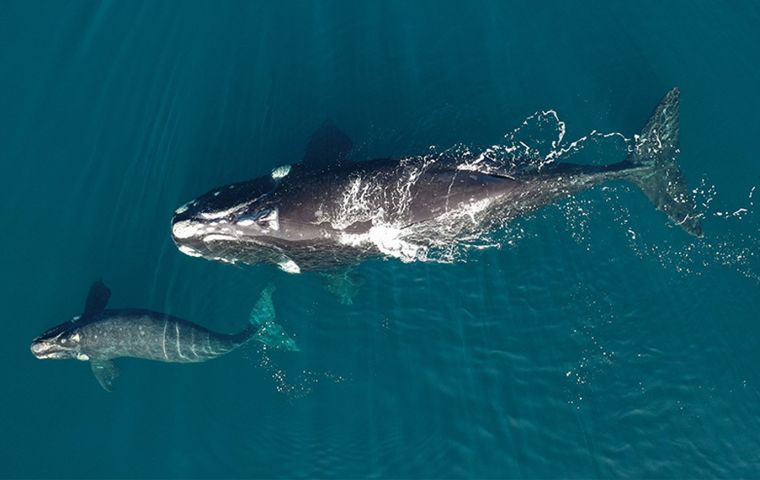MercoPress. South Atlantic News Agency
New satellite monitoring of whales in South Atlantic underway
 The satellite tracking of the whales seeks to understand how they respond to climate change and thus promote measures for their conservation
The satellite tracking of the whales seeks to understand how they respond to climate change and thus promote measures for their conservation The 7th edition of the whale satellite monitoring program by the Argentine branch of the Wildlife Conservation Society started the monitoring of 22 specimens in the Atlantic Ocean to obtain data on the life cycle of the southern right whale species, it was reported.
The collaborative project, which began in 2014, aims to provide information to locate key environments for the life cycle of the species while trying to understand how whales respond to climate change and thus promote measures for their conservation.
The animals, 16 from the Nuevo Gulf in Chubut, and 6 from the San Matías Gulf, in Río Negro, have been tagged after precious and semiprecious stones. The monitoring, which is carried out with satellite technology, can be closely followed both by experts and by those who are interested through a specialized website for the case. The devices reportedly stop transmitting when they become detached or when their batteries run out, which can occur weeks or months after they are placed, depending on a number of factors.
“Satellite tracking generates information about aspects of the behavior of this hitherto undescribed whale population, particularly in areas far offshore. Among other variables, the researchers study the use of the North Patagonian gulfs, speed, and daily travel distances. In recent years, they have also been able to identify the areas and distances covered in a complete migratory journey of a whale with a calf, the differences in the migratory journey of the same whale in two different years -once as a mother and once without a calf- and keep a record of southern latitudinal migration of mothers with calves. The study provides scientific information and contributes to the mission of the International Whaling Commission, of which Argentina is a signatory and member of great importance about the Management Plan for the Conservation of the Southern Right Whale of the Southwest Atlantic,” the organization underlined.
Throughout these seven seasons, the trajectories of a total of 87 individuals in the Valdés Peninsula and the Argentine maritime coast were recorded in order to know the migratory routes and feeding areas in the South Atlantic and sub-Antarctic seas used by the whales.




Top Comments
Disclaimer & comment rulesCommenting for this story is now closed.
If you have a Facebook account, become a fan and comment on our Facebook Page!